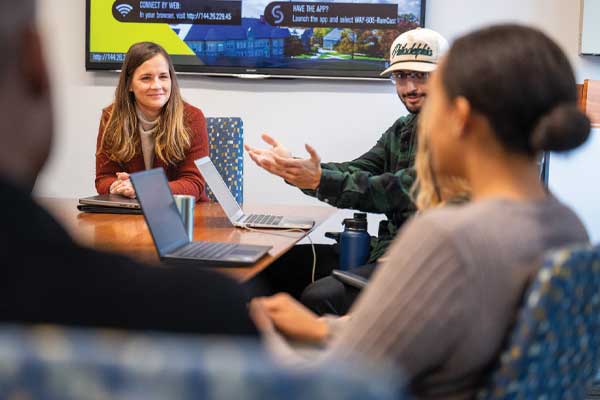
UNIVERSITY NEWS
Serving the Community with
Science-based Mental Health Care

Dr. Stevie Grassetti (left) with her students
AN ASSOCIATE PROFESSOR IN WCU’S PSYCHOLOGY DEPARTMENT AND DIRECTOR OF WCU’S DOCTOR OF PSYCHOLOGY (PSYD) PROGRAM, DR. STEVIE GRASSETTI ENSURES THAT HER STUDENTS HAVE MULTIPLE OPPORTUNITIES TO APPLY THEIR LEARNING TO PROMOTE THE GREATER GOOD ACROSS VARIOUS REGIONAL POPULATIONS.
“As a clinical psychologist, my work bridges research and practice. Our research team brings effective mental health initiatives to the community in accessible forms, we adjust those initiatives based on the community’s needs, and we test whether these modified programs are associated with benefits to community members,” she explains. “Undergraduate students have an opportunity for high-impact learning when you teach them how to apply their education to serve the community.”
One community-engaged research service project her students facilitate takes place during the “after the bell” program at Kennett Middle School in the Kennett Consolidated School District in Kennett Square, PA. It’s a six-week drama improv program. Teams of two psychology students are trained to implement the afterschool program and receive supervision throughout the implementation. Sarah Richter, a PsyD student who developed the program, piloted it in 2023 and is working with Dr. Grassetti to test it as her dissertation project.
“Children and families encounter countless barriers that may prevent them from seeking mental health services and, so, exposure-like exercises like drama improv can bring ‘active ingredients’ of therapy to kids in a more accessible format that can help alleviate social anxiety,” says Dr. Grassetti. “It’s reciprocally beneficial to WCU students and to youth in the community, and it’s fun, too,” she says.
While the program is still in its early phases and data are not yet ready for analysis, Dr. Grassetti, Richter, and the rest of the research team hypothesize that participation will be associated with reductions in social anxiety and gains in confidence. A benefit of interventions such as this is how the research is informed by the community and how WCU students have opportunities to gain both research experience and applied service experience. Connecting research to community-based clinical work provides service to those in need.
Dr. Grassetti, who trained across community mental health, juvenile justice, and academic medical settings, directs the WCU Research Advancing Implementation Science Equitably (RAISE) lab. She established the lab in 2018, the same year she joined the WCU faculty. Both undergraduate and graduate students participate in research in collaboration with community partners. The researchers, many of whom also provide direct services to youth and families, are invested in understanding how treatment works best in the community and how to train students to address the community’s mental health needs.
An example is a patient-centered collaboration with Nemours Children’s Health System that investigated how “warm hand offs” (patient introductions to members of the treatment team by other members of the treatment team) can facilitate collaborative care and improve service utilization.
“We are investigating factors, including medical provider background and patient presentation characteristics, that contribute to the successful integration of psychologists into primary care settings where patients are most likely to access care,” Dr. Grassetti reports.
This spring, Dr. Grassetti and her PsyD student Jenna Loquercio teamed with faculty in nursing and social work to train students together in the Duey Immersive Learning Center in the Sciences and Engineering Center and The Commons on the “warm hand-off” and to test whether this simulation training is associated with hypothesized learning outcomes for WCU students. She plans to conduct similar trainings at least twice each semester.
“The complex needs of patients require an interdisciplinary approach. Specialists working together to provide patient-centered care improve access and promote better health outcomes. To be prepared to work in these integrated settings in the future, our psychology, nursing, and social work graduates need intentional opportunities to develop their interdisciplinary skills.”
Dr. Grassetti is also the current faculty fellow for WCU’s Office of Research and Sponsored Programs (ORSP), facilitating interdisciplinary collaboration on research across all of WCU’s colleges and departments and promoting opportunities for student researchers.
“It’s invaluable to have the ORSP faculty fellow,” says Dr. Cheryl Neale-McFall, associate provost for research and creative activity. “Faculty have the current perspective on faculty needs, challenges, and opportunities to pull from across the entire University to support all faculty and to better engage students with faculty mentors.”
In addition to her role as fellow, Dr. Grassetti chairs the Council on Undergraduate Research and directs the ORSP college liaisons, who represent each of WCU’s colleges.
Serving the community is never far from her mind. Dr. Grassetti is now developing a ADHD assessment clinic. The clinic will serve community members who are in need of accessible, low-cost ADHD assessments while providing valuable opportunities for WCU students’ clinical training as well as research.

Children and families encounter countless barriers that may prevent them from seeking mental health services and, so, exposure-like exercises like drama improv can bring ‘active ingredients’ of therapy to kids in a more accessible format that can help alleviate social anxiety.
-Dr. Stevie Grassetti
More from the Spring 2025 Issue
News
Innovative Techniques
Music faculty member recognized
Jackie Hodes
Honored with Award
WCU’S Sesquicentennial
Anthropology Museum’s Book
Profiles
Donor:
George Dargay Memorial Endowment
Alumni:
Taylor Boyle ’23
Student:
Alyssa Gabrilovich




